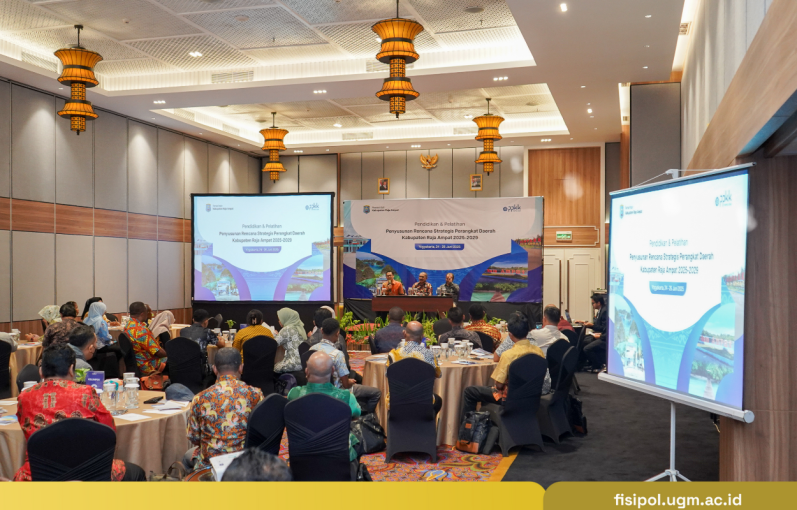
Yogyakarta, June 27, 2025 — A strong commitment to fostering adaptive and visionary governance was once again demonstrated through the implementation of a Strategic Planning Training Program (Diklat Renstra) for regional government agencies of Raja Ampat Regency for the 2025–2029 period. The program was held in Yogyakarta from June 24 to 26, 2025.
The opening ceremony was marked by a warm and collaborative atmosphere, attended by the Vice Regent of Raja Ampat, Drs. Mansyur Syahdan, M.Si.; the Dean of FISIPOL UGM, Wawan Mas’udi, S.IP., MPA, Ph.D.; and the Chair of the Board of Experts of the Center for Capacity Development and Cooperation (PPKK) at FISIPOL UGM, Prof. Gabriel Lele. Participants included representatives from various regional departments within the Raja Ampat government.
Over the course of three days, participants engaged in intensive sessions led by facilitators and experts from PPKK FISIPOL UGM. The training adopted an interactive and experiential learning approach, emphasizing learning by doing. Rather than passive instruction, participants were actively involved in discussions, brainstorming sessions, simulations, and presentations. The curriculum covered the entire strategic planning process—from identifying key strategic issues and formulating goals and objectives to developing strategies, policy directions, and priority programs.
Through hands-on simulations, participants drafted initial versions of strategic plans for their respective departments—serving as the foundation for five-year development plans that are contextual, data-driven, and results-oriented.
The core objective of the training was to provide direct technical assistance in the preparation of strategic planning documents that go beyond administrative compliance to embody strategic thinking and responsiveness to local challenges in Raja Ampat.
This initiative aligns with FISIPOL UGM’s commitment to advancing the Sustainable Development Goals (SDGs), particularly:
-
SDG 16: Peace, Justice, and Strong Institutions, by strengthening public institutions to become more effective, accountable, and inclusive;
-
SDG 11: Sustainable Cities and Communities, through participatory and sustainable planning that addresses regional development challenges;
-
and SDG 17: Partnerships for the Goals, by fostering cross-sector collaboration to achieve impactful development outcomes.
The program concluded with a closing session led by the Secretary of the Regional Development Planning Agency (Bappeda) of Raja Ampat, Irianty Malawat, S.IP., MM., and the Director of PPKK FISIPOL UGM, Dr. Arie Ruhyanto. Both underscored the importance of sustaining the momentum from this training in advancing a more adaptive, measurable, and community-centered regional planning process.
Through this training program, FISIPOL UGM once again affirmed its role as a strategic partner for local governments, committed to strengthening bureaucratic capacity and promoting progressive, data-informed, and participatory governance. A small yet significant step from Yogyakarta, paving the way for a more hopeful future in Raja Ampat.
